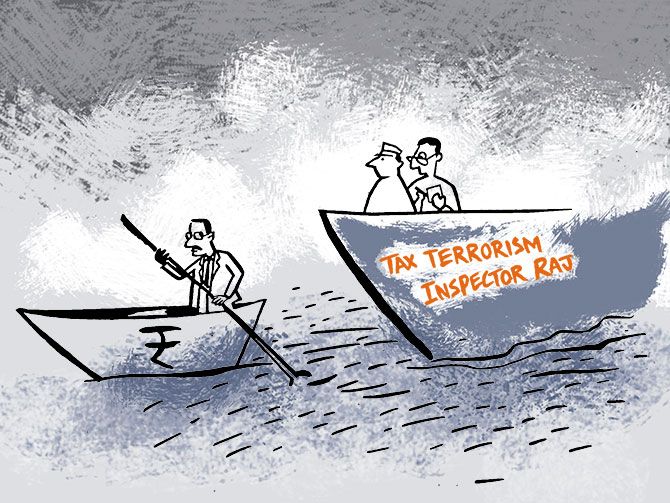'I don’t think Siddhartha has done anything wrong. He has not managed his debt well. In any case, he is not the best example of the system going wrong or the system pushing him hard. I think on that particular day, he was depressed and took an impulsive decision. It will be unfair to blame the system.'
Illustration: Dominic Xavier/Rediff.com.

The suicide of Café Coffee Day founder V G Siddhartha has sent shockwaves across the country.
On one side, the government is talking about encouraging more entrepreneurs to start businesses and on the other, successful entrepreneurs like Siddhartha are harassed by IT officials -- which the CCD founder mentioned in his letter to the board.
How will this affect the morale of young entrepreneurs?
As the author of the book CK Prahalad -- The Mind of the Futurist, Benedict Paramanand analysed how liberalisation impacted entrepreneurship in India. He is also the editor of Sustainability Next and founder of the Bangalore BizLitFest.
In this interview to Rediff.com's Shobha Warrier, Benedict, below, talks about what might have affected Siddhartha, the entrepreneur. "Inspector Raj has increased. Tax terrorism has increased. Even the BJP business members use the term 'tax terrorism'," he says.
As a person who has written a book on how entrepreneurship in India changed after 1991, how do you look at the tragic story of Siddhartha? Coming from a family of coffee growers, he is a first-generation entrepreneur.
Yes, he is a first-generation entrepreneur who became over-ambitious and over-stressed himself because he went into multiple businesses.
That is the trait of an Indian entrepreneur who instead of growing one or two businesses in a big way, tries to dabble in many ventures. This way, they complicate things.
Why do you say it is a trait specific to Indian entrepreneurs?
If you look at Indian businesses, every business family in India is into multiple business ventures with each family member managing different ventures.
But it is a big risk for a first-generation entrepreneur. Instead of focussing on one or two businesses, they try to do five or seven businesses at the same time and burn their fingers.
You take Vijay Mallya. Anil Ambani is another example. While Mukesh Ambani has the legacy of the family business, Anil Ambani ventured into newer areas.
This is the trait I have noticed among those who became entrepreneurs 15-20 years back.
Their feeling is, if we have succeeded in one, why should we not in the other too. Their main problem is, they over-leverage and are blind to long term risks.
But the new generation entrepreneurs who have started five years back like Flipkart are smarter and focus on one or at the most two businesses.
Why are entrepreneurs over-ambitious?
Entrepreneurship is nothing but taking risks. It is good to be ambitious and you have to be ambitious to succeed. At the same time, financial prudence is very important.
Those who do not give importance to financial prudence are the ones who fail. Ethics also is as important.
Debt management is as important but it is an area that is taken lightly by many entrepreneurs.
You see over-ambitious entrepreneurs borrowing unscrupulously.
The rule of business is, you have to keep growing as long as there is growth potential.
Pioneers try to maximise their potential in a particular area. The question is, where do you stop? It is here that business acumen plays a role.
Finally, it boils down to ethics and I have to say ethics is an area that is talked less in India.
Let us take the example of Infosys. They are first generation entrepreneurs and have grown so big but look at their corporate governance structure. The same is the case with Wipro also.
If entrepreneurs follow good governance structure, they de-risk their business. But many of them do not have it.
There are two types of first-generation entrepreneurs; one who want to follow the conservative, right way and there are others like Mallya who want to find the easier way of paying up and going up quickly.
I wouldn’t compare Siddhartha who was more prudent, with Mallya or Anil Ambani. His letter says his assets are much above his liability. He was not bankrupt unlike many others.
 But he faced tremendous pressure from lenders and government officials…
But he faced tremendous pressure from lenders and government officials…
Yes, it was the pressure from the system that got into him.
In recent times, the Government of India has gone after entrepreneurs who have invested in multiple areas and whose capital is locked in those areas. They are forcing them to sell those and pay the debt. I am not saying it is not a good thing.
Do you feel in India, businessmen are looked at with suspicion by the government?
There is a trust deficit in India between the business and political structure. Both are culpable.
Entrepreneurship in India is still looked at with mistrust by politicians and bureaucrats. We thought it would end after the reforms and after the BJP coming to power. But in the last five years, it has only increased. Inspector Raj has increased. Tax terrorism has increased. Even the BJP business members use the term 'tax terrorism'.
Is making money looked at as a sin in India even now?
In the corruption global index, India is one of the highest while transparency is one of the least. There has been a symbiotic relationship between businesses and politics in India and it is still continuing. In fact, crony capitalism has become even stronger now. How do you explain the ruling party getting 90% of the funding this year?
In India, out of 10, 2 or 3 entrepreneurs are almost clean and committed to what they want to achieve. The rest try to manipulate the system. The fight has always been how to increase the number of good business people.
If tax terrorism and crony capitalism continue, do you think the first-generation entrepreneurs will find it difficult to bear the pressure?
To give credit to what the government is trying to do, they are trying to clean up the system which is needed anyway. While they try to do that, it may result in a situation where some may find it difficult to take the pressure.
Right now, the list of wilful defaulters is big because the government has been lax on it for a long time due to the triangular nexus between the public sector banks, politicians and businesses.
Siddhartha was in distress due to the huge debt he had, and his letter speaks of harassment…
Debt is a big problem all over the world. There are ways by which you mitigate the debt. In 2015, the Government of India introduced a Bankruptcy Law to help those in debt.
You should accept the fact that not all businesses succeed. Only two out of ten succeed. So, what happens to the eight? Should those eight entrepreneurs be in distress because they failed?
The ecosystem has to be benign in a way to de-risk the basic necessities of an entrepreneur. That’s why under the new law, you don’t take away the entrepreneur’s house and his basic necessities.
You don’t get many entrepreneurs into the system because of the risk to failure. If you have a good Bankruptcy law, there will be more entrepreneurs coming.
On one side, the government is talking about the need to have more entrepreneurs and on the other side, you see harassment by government officials.
I don’t think Siddhartha has done anything wrong. He has not managed his debt well. In any case, he is not the best example of the system going wrong or the system pushing him hard. I think on that particular day, he was depressed and took an impulsive decision. It will be unfair to blame the system.
CK Prahalad called Indian entrepreneurs as the new freedom-fighters. If India is to have inclusive and rapid growth it has to create and nurture an entrepreneur-friendly ecosystem.
What's not funny is, in their zeal to create a business-friendly economy, the BJP has managed to do the opposite.
Do you think Siddhartha’s suicide will affect the morale of new entrepreneurs entering the field?
I think this tragedy will encourage new entrepreneurs to manage their debt better. Debt is good if it is managed well. Debt is a real fuel to business.
But how much appetite you can have for debt? The New India is still discovering that. The old India had managed debt very badly and put the risk only on the system.












 © 2025
© 2025